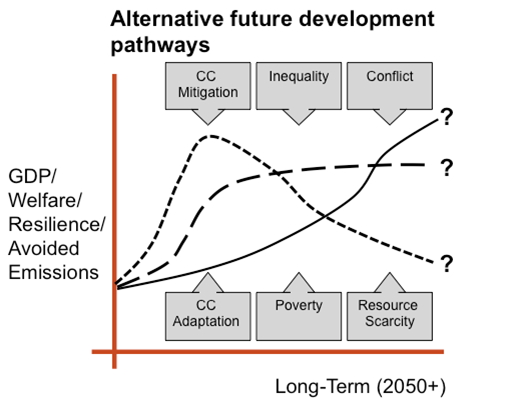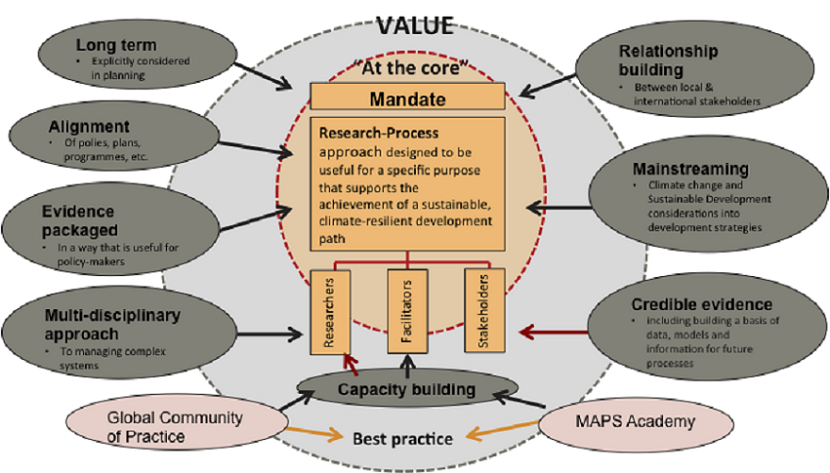MAPS emerges as an alternative approach for green growth strategising in Africa
MAPS emerges as an alternative approach for green growth strategising in Africa
Anthony Dane from the Energy Research Centre (University of Cape Town) reports on recent research findings presented at the third Annual Conference on Climate Change and Development in Africa. The study shows that a MAPS approach to green growth planning could emerge as an alternative strategy for an African global climate change framework that has domestic assessments as its core.
The third Annual Conference on Climate Change and Development in Africa (CCDA-III) took place from 21 – 23 October 2013 in Addis Ababa, Ethiopia. The theme of the conference was ‘Africa on the rise: Can the Opportunities from Climate Change Spring the Continent to Transformative Development?’.
I presented a paper co-authored with Marta Torres Gunfaus. The paper drew from the work undertaken as part of the CDKN-supported Mitigation Action Plans and Scenarios (MAPS) Africa feasibility study. The feasibility study is considering whether the MAPS approach can potentially deliver benefits in the African context and, if so, what the design of such programmes would need to be. The promising results of the study thus far convinced Marta and I to submit a paper to the conference. The paper proposed MAPS as a domestic approach to developing an evidence base, through a stakeholder-driven process that supports desired transformative development in Africa.
The CCDA-III conference objectives
The conference presented an opportunity for stakeholders to deliberate on Africa’s development in the context of climate change. It attracted influential experts and decision makers with experience in climate change and development. The key objective was to provoke debate on important issues, share knowledge and foster relationships for future collaboration.
Through high-level plenary sessions and smaller sessions allowing interrogation of ideas and sharing of knowledge, participants focused on issues relating to climate science, data and services for Africa’s adaptation and mitigation, policy to build resilience, climate finance, green economy and Africa in the global climate change framework. A number of themes emerged with particular relevance to the MAPS approach. Africa needs:
- to share successful experience in linking researchers and policy makers;
- to produce relevant knowledge generated in Africa
- to promote South-South collaboration; and
- solutions that are tailored to support country-specific transformational development pathways.
Dr David Lesolle from the African Group of Negotiators (AGN) summarised the challenge well: “we need to sing our own song”. Africa needs to do its own research and identify the preferred development pathways that make sense for the continent. It needs to use this information to inform African positions based on unique development needs and opportunities.
The MAPS approach could have the potential to meet some of these needs.
MAPS as an approach to integrate climate resilience into long-term development paths
Many African countries are grappling with the design and implementation of approaches to achieving desired long-term development paths that consider climate change and other green growth objectives. Which development paths should countries pursue to optimise a range of sometimes competing economic, social and environmental objectives?
To balance trade-offs, it is critical to establish the evidence base for a long-term transition to robust economies that enable socio-economic transformation and are both carbon efficient and climate resilient. MAPS was tested as an existing framework to support the desired transformative development.
Based on experience from South Africa and Latin America, the ERC and SSN team identified potential areas where MAPS could add value. These are shown in the figure below.
An assessment was conducted on the potential to realise those benefits in Ghana, Mozambique, Rwanda and Zambia, as case study countries. The assessment drew on desktop research, engagements during country visits and outputs from a country-syndicate-based assessment of the value and proposed design of a MAPS programme, during a workshop held in Cape Town.
It was local researchers and participants who felt that a MAPS process could be relevant and beneficial in their countries. The greatest benefit was seen in the potential to align climate and development-related policies, plans and programmes, generate credible evidence and build local capacity. Stakeholders also called for a MAPS programme that could generate evidence to substantiate existing development pathways or visions and support implementation in the countries.
Although a common set of benefits was identified, each country has different needs, which also differ from those of South Africa and Latin American countries. Based on these needs, Anthony and Marta proposed a set of policy questions and potential approaches to generating the evidence needed to answer these questions. These could be different for each country and could include a combination of these questions and approaches:
- What are the different pathways to achieve developmental and sustainability goals?
- What are the most cost-effective developmental choices in the context of climate change?
- What evidence and knowledge base is needed to enable the implementation of plans?
- What are the risks and opportunities of different policy options regarding the management of large fossil fuel reserves?
Various approaches to answer these questions are being considered, in collaboration with local researchers and facilitators.
Marta and I argued that the principles of objectivity (in the research) and inclusiveness (in the research process) prioritise different objectives and balance trade-offs to culminate in legitimate and robust options for low carbon development paths available to policy-makers. This approach is relevant to the African context and emerges as an alternative strategy for an African global climate change framework that has domestic assessments as its core.
CDKN is supporting the feasibility study for MAPS Africa. For more information on the project visit the project page. For more information on the MAPS Programme visit the programme website.
We occasionally invite bloggers from around the world to provide their experiences and views. The views expressed here are those of the author, and not necessarily those of CDKN.
Photo of the MAPS Africa team: Marta Torres-Gunfaus, Constant Labintan, Anya Boyd and Anthony Dane (courtesy of MAPS).


